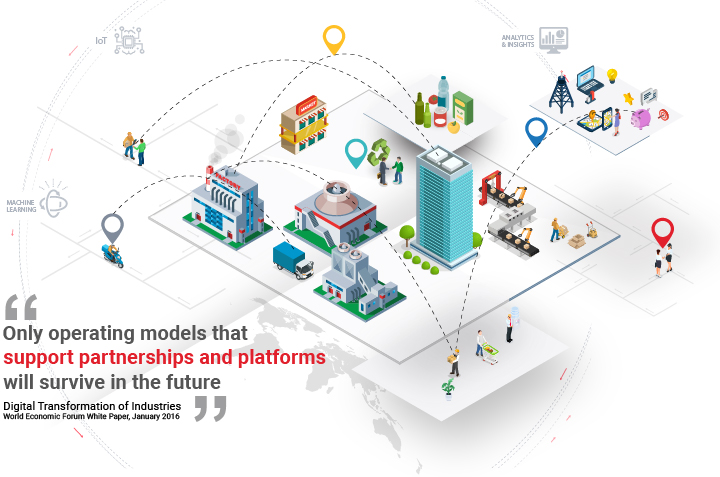Experiences Are the Catalysts to New Value

It’s good news that most organizations are shifting their thinking away from the early idea that digital strategies can be found in their digital tools, products and vendor relationships. And while building a technology-enabled digital spine is a critical investment, it’s important to believe at this juncture that technology alone will probably be, unfortunately, the least transformative factor in new business-digital models.
Now comes the hard work.
A little less digital, a lot more ecosystem
Business ecosystems are the structures behind these new models. For legacy organizations, mobilizing their business ecosystems (and extending them over time) is often at the heart of their business strategies for exponential growth. This makes perfect sense – the asset-rich environments in legacy businesses hold tremendous value, but only if we can get the ecosystem working in the nonlinear, networked models perfected by digitally native companies.
Business growth is based on new value creation
In these new business ecosystems, value is realized when previously untapped or underutilized resources and assets – including people – become activated and engaged. Instead of a closed, structured, hierarchical system based on a model of minimal through-put and scarcity of resources, these business ecosystems turn on, open up, and make visible previously unavailable resources and capabilities in a model based more on abundance and access than on ownership.
New value creation means new ways of working
In platformed business models, people are rewarded through their productive participation and co-creation behaviors and impacts. Anyone and everyone can ideate, lead, influence, and win. New ways of working are dictated by these models, and behaviors such as knowledge-sharing, systems-based reasoning, innovation, acute insights, and diversity of ideas are all inherent (or should be) in the model. It’s hard – if not impossible – to be successful without adopting these work practices.
Platforms enable these new business ecosystems
Emerging ecosystems use business platforms that provide the connectivity, components, services, and tools for participants using progressive digital technologies. Platforms enable critical interactions and transactions to occur, creating value for participants and leaving learnings behind as a byproduct for all participants to mine and extend in the future.
Over time, these platforms must evolve with new participants while the business ecosystems themselves extend and conjoin with other ecosystems. Platforms become more valuable, therefore, as more people use them and as ecosystem-to-ecosystem relationships are established. New digital capabilities bring richness in functionality – blockchain, AI, IoT, and so on – accelerating the combinatorial and exponential effect of the model.
Platforms activate complex business ecosystems
and leverage the combinatorial power of progressive digital technologies to facilitate frictionless interactions among participants and create new value and learnings for all.

It’s easy to miss fundamental platform needs
It’s not surprising, all said, that legacy businesses are embracing these new business ecosystems and digital platforms urgently – yet struggling at the same time with the fundamental shifts in thinking and working that they require.
Digital strategies, unfortunately, can focus too much on the digital spine, missing new contexts of value and ways of working implicit in these ecosystems. This results in grossly under-weighing the range of organizational changes needed for digital to succeed. Without consideration for new work, the impact on jobs, experience design, and changes needed in organizational culture (realized as changed mindsets and behaviors of people), these strategies run the risk of building spines without the organizational “soft tissue” that would leverage their potential.
Experiences are the “street-level” view of the platform
If ecosystems are the top-down view of new digital business models, then experiences are the street-level view – and often the only view that people have and understand. From people’s perspectives, the experience is the platform, and the platform is the experience. Think Uber, for example.
In this context, experiences are the catalysts to realizing new value in new business ecosystems as they enable platform participants. To be effective, they need to anticipate, activate, and sustain the relationships in the ecosystem. These relationships are mostly people-based today – peer-to-peer, that is, as human-to-human or human-to-organization. As a result, people as participants are at the center of these models and ecosystems.
Going forward, though, we’ll see this peer definition expand to include entities that are not human – e.g., a legal entity, a group, a software agent, an algorithm. As non-human actors come into our business ecosystems (often replacing people or bringing in brand new capabilities altogether), people will need to interact effectively with them. So, another role of the experience is to enable the human-to-machine relationships increasingly common in the future state. These new relationships that experiences foster will empower workers in unprecedented ways while differentiating digital organizations in concrete ways. With a strategic basis, experiences will benefit workers and organizations alike.
Conclusion: this is digital transformation in action
Organizational systems and structures are necessarily upended as companies evolve into business ecosystems that operate on entirely different paradigms, structures, and timeframes than our legacy businesses. Phenomenal digital innovations and advancements (themselves moving non-linearly in time and at combinatorial speed) enable business-digital platforms where people are collaborating not just with other people in different places, organizations, and industries, but with new digital actors. Value is exponential as more people join in and these ecosystems eventually replace vertical markets as we’ve known them with interconnected, organic mega-ecosystems that move also in exponential progression.
With few hard assets, unfettered access, and few barriers or ceilings to success, hyper-commerce plays out in what some argue could be a “winner take all” outcome. It’s why futurists and tech entrepreneurs alike are focused on how we collectively harness the tremendous good that is possible with the daunting challenges that we will clearly face.
As we apply these platforms, it will take tremendous care to create the right digital experiences, ones that insightfully balance and align impressive technological possibilities with business strategy and cultural requirements.
About this whitepaper
POSTED: August 15th, 2018
TAGS: business strategy, change management, consumer-grade experiences, digital ecosystems
